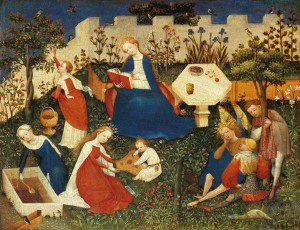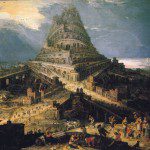
Nostalgia, nostalgia, nostalgia—these days a common thing. My father re-watches Smokey and the Bandit, pining simultaneously for a culture and place he has never really known (smuggling, the American South) and for whomever he was in 1977, younger, with more hair. I myself feel it in the way many “90s kids” do: in the form of a desire to return to childhood, to watch Rugrats and experience once more the feeling of wholeness and simplicity I knew while mindlessly absorbing Blue’s Clues.
These common forms of nostalgia attempt to recover a state of mind that never was (I do not really know how I felt watching Rocko’s Modern Life), all the while recognizing that such a recuperation is impossible. Yet the desire itself brings a feeling of contentment, and so we indulge it. By and large, this is not problematic—at minimum, it can be soothing, even as it reminds of us of change and alienation.
There are, however, more insidious forms of nostalgia; some of these are religious and political in nature (and, unsurprisingly, since I am a religious person with political sensibilities these are particularly fascinating to me). But they are not merely interesting at the personal level; no, they have complex effects in the real world. Enter Donald Trump making America great again; witness the Traditionalist preference for the fiddle-back over the contemporary chasuble (which, let’s be honest can only be because one has associations with the Extraordinary Form. I mean, the fiddle-back looks like someone cut a thumb-shaped hole in an Afghan carpet—so much less flow, so much less Roman!).
Liturgy, faith, politics—all of these are informed by nostalgia in one way or another, often to the detriment of more nuanced or constructive ways of preceding with reform, change, and critique. Thus I would like to remind us of something easily forgotten: that nostalgia as we understand it has no place in orthodox Christianity; it is simply foreign to it.
How can I possibly mean that? Apostolic Christians have always loved tradition! Didn’t St. Irenaeus cover this: “It is possible, then, for everyone in every church, who may wish to know the truth, to contemplate the tradition of the apostles which has been made known throughout the whole world”? As Abelard put it: sic et non. It is true that we treasure Tradition, but honoring where we come from is not the same as the desire to reconstitute it—return to it—in the present. One could turn to Newman on the development of doctrine or think about the various liturgical and theological reforms that have taken place over the course of Church history (e.g. early Platonism, Augustinianism, Thomism, etc.), but I’d like to start somewhere simpler: Eden.
Christianity is, of course, an ancient religion that has grown and changed in fits and starts over two millennia; before that we have the traditions of ancient Judaism, in our eyes the precursor to our faith. And, as we might forget, most ancients did not see the past as a time to return to. In fact, it was built in to many an ancient myth that the past could not be recovered. One might see the past as worthy of emulation (though always with difference implicitly built in), even of lament, but recuperation in toto was out of the question. Ovid’s meditation on the past in his Metamorphoses is instructive:
First was the Golden Age. Then rectitude
spontaneous in the heart prevailed, and faith.
Avengers were not seen, for laws unframed
were all unknown and needless. Punishment
and fear of penalties existed not […]
The towns were not entrenched for time of war;
they had no brazen trumpets, straight, nor horns
of curving brass, nor helmets, shields nor swords.
There was no thought of martial pomp –secure
a happy multitude enjoyed repose.
Then of her own accord the earth produced
a store of every fruit.
The point is simple enough: things were perfect then, peaceful and without scarcity. In his account, things keep getting worse and worse as we descend into the Silver Age, and then the Bronze one. In the end, we arrive at the Iron Age, a time defined by the desire to dig for metal for weapons and money, an epoch scarred by scarcity and competition. It is clear that Ovid did not conceive of this past age as recoverable within human terms; in fact, what defines the Iron Age is precisely what defines human existence: violence, injustice, strife, etc. The Golden Age was Edenic; its fruits lost.
I use “Edenic” very purposefully, because (perhaps unsurprisingly) this same schema maps on to medieval Christian conceptions of the past. The idyllic past here has the concrete form of a garden, out of which human beings were cast. Now knowing good and evil, the Christian can not in any way go back; only the Eschaton can do that. Take, for example, Chaucer’s “The Former Age,” which riffs on Ovid (likely with some Boethius thrown in). He repeats most of the expected tropes from his source, but note what he adds at the end:
The lamb-like people, devoid of all vice,
Had no fantasies of debate,
But each of them cherished the others.
No pride, no envy, no avarice,
No lord, no taxation by any tyranny;
Humbleness and peace, good faith was the empress.Jupiter the lecherous,
The father of all delicacy,
Had not yet come into the world.
Nor had Nimrod, desirous to reign,
Yet made his towers high.
Alas! Alas! Now men may weep and cry!
Chaucer names Nimrod of Biblical fame, signaling that, for him, it is the introduction of history—that is everything after Eden—that signals the full fall from the “Former Age.” Even this term is critical: there is one “former age,” not the many stages seen in Ovid, because, as a Christian, Chaucer means to evoke Eden (at least to some extent). Jupiter is retained (medieval people were not afraid to blend the pagan in their tales and poems), but the timeline has shifted. “Now men may weep and cry” because all is corrupt—man is fallen.
What is clear here, then, is that neither Ovid nor Chaucer sees the past as recoverable, but there is something more important afoot: perfection is located outside of time (for Chaucer anyhow, more debatably for Ovid, depending on how we define “time”). Not simply perfection either, but “betterment” or “improvement” in absolute terms. To be within time is to be subject to the vicissitudes of fortune. Chaucer, again, makes this clear; this time in his poem “Fortune”:
O Socrates, you steadfast champion,
She [Fortune] was never your tormentor;
You never dreaded her oppression,
Nor did you find savor in her cheer.
We can agree with Chaucer’s pseudo-Stoicism here or not, but the notion is the immobility / timelessness are to be opposed to mobility / time. Standing up to Fortune means making oneself impassable. At minimum, this locates ruin within history itself. One accepts without question that being human means suffering, whether past, present, or future—things were never better, except in Eden. All one can do is hope to cultivate a personal response to the problem of history.













